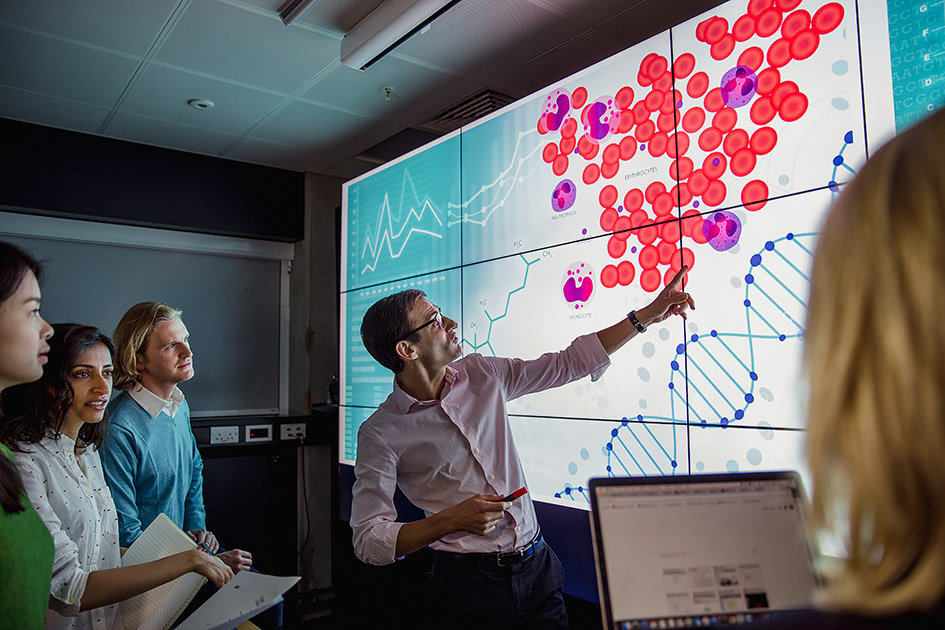Economy
Innovation andEvidence
Innovation describes the development, implementation and dissemination of new processes, products or services in economy, policy, or society. They can include new technologies such as smart grids, but can also be socio-cultural in nature, such as new citizen participation concepts, the sharing economy and crowdsourcing and outsourcing corporate tasks.
New social models such as the concept of "sharing instead of owning" or "the good life" can be developed through cultural innovations. As with the digital revolution, technological, social and cultural innovations can influence and reinforce one another. Innovations play a crucial role when it comes to system transformations. Often, those innovations provide the necessary momentum for a system that lacks sufficient force to change on its own. But how do you know which innovations are viable for the future and how do you design the path from innovation to market entry and, ultimately, market penetration?

To a large extent, decision makers are guided by evidence, meaning any form of direct insight with a particular claim to truth (in contrast to the narrower Anglo-American understanding of evidence). The Wuppertal Institute supports decision-making processes in various fields of action with its research based on scientific facts. On the one hand, this includes the transformation towards a step-by-step, dematerialised circular economy and, on the other hand, implementation of the energy transition ("Energiewende"). Those two transformation processes can only be achieved by cultural, social, and technological innovations at all levels – from households and municipal administrations to transnational corporations and the United Nations. Depending on their political context of action, economic and political decision makers need different evidence to deal with the upcoming innovations.
Depending on the context, simple narratives or heuristics (rules of thumb) can contribute to this. Otherwise, complex quantitative empirical evidence and intricate modelling are necessary. For this the Wuppertal Institute provides the necessary tools. One important field of application for innovation-related evidence is structural policy (regional policy, economic and innovation promotion) with references to the environmental economy (green economy) and transformation research. Furthermore, the Wuppertal Institute supports national and European decision makers when it comes to the development and multi-criteria assessment by providing impact assessments and evaluations.
Contact
Prof. Dr.-Ing. Philipp Schepelmann
Tel.: +49 202 2492-242
Prof. Dr.-Ing. Manfred Fischedick
Tel.: +49 202 2492-121
Publi-cations
Here you find publications on innovation and evidence.
Related publications
Heating Energy Feedback in Apartment Buildings
Interface Design as the Key to a Participatory Energy Transition
The International Carbon Market is Shifting Gears
Carbon Mechanisms Review "Shifting Gears" published
Voraussetzungen für eine erfolgreiche Implementierung von CCU, CCS und CDR
Handlungsempfehlungen für die Carbon-Management-Strategie des Bundes
New Finance Scheme for Greater Energy Efficiency in Privately Rented Dwellings
Article on reducing CO2 emissions in the residential sector published in "Energy Research & Social Science"
Web Platform for Optimising Heating Energy Efficiency in Commercial Buildings
Paper published: Matching user needs and efficiency measures for energy savings in heating systems
SOLUTIONSplus: Tailor-Made Solutions for E-Mobility Worldwide
48 consortium partners and over 100 associated partners are spreading innovative e-mobility worldwide – with social, ecological and economic synergy effects
This is how Mobility Data can Drive the Mobility Transition Forward
Policy paper with recommendations for mobility-as-a-service, mobility management and traffic planning presented
Establishing Digital Product Passports
Wuppertal Paper presents current solution approaches to the digital product passport for the establishment of a circular economy
Raising Climate Awareness at Schools
Wuppertaler Theses on the Schools4Future project published
Time for a change of course: towards a climate-friendly, resource-light society
Contribution to the political debate in the 2021 election year
Transdisciplinary Sustainability Research in Real-World Labs
Team of authors on success factors and challenges of the still young research approach
Digital Eco-Innovation as a Means to Reach a Circular Economy in Europe
New Biennial Eco-innovation Observatory Report draws attention to digital circular policies and technologies
When Climate Meets Economy
How does this affect the legitimacy of international institutions?
An Obituary for the Age of Development
New edition of "Development Dictionary" and article by Wolfgang Sachs
Digitalisation of the German Energy Sector
Article discusses digital applications in the energy sector
International Energy Policy Required
Climate compatible energy supply is not enough to overcome challenges
Developing a Highly Efficient Micro-Scale CHP System
25th European Biomass Conference and Exhibition proceedings online
Vision Development towards a Sustainable North Rhine-Westphalia 2030
Paper presents results from a science-practice-dialogue
Automating Agent-Based Modelling
Data-driven generation and application of innovation diffusion models
Understanding the Diffusion of Domestic Biogas Technologies
Systematic conceptualisation of existing evidence from developing and emerging countries
Projects
Here you find research activities in the field of innovation and evidence.
